Displaying items by tag: Peter Malone's Movie Reviews
Here and Now/ Blue Light
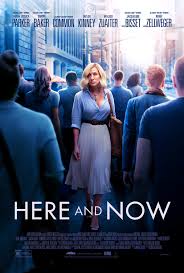
HERE AND NOW
US, 2018, 91 minutes, Colour.
Sarah Jessica Parker, Simon Baker, Gus Birney, Jacqueline Bissett, Common, Taylor Kinney, Renée Zellweger.
Directed by Fabian Constant.
First called The Best Day of my Life, ironic title, being called Blue Light, the film is now Here and Now, focusing on 24 hours in the life of singer, Vivenne. She is played by veteran actress, Sarah Jessica Parker well-known for films as well as for the television series, Sex and the City.
At the opening of the film, Vivenne visits a doctor, gets a diagnosis of cancer in her brain. The next 24 hours, until her next appointment, the audience accompanies Vivenne wandering through the city of New York, late for a rehearsal at the club where she has worked for 25 years, contact with her manager (Common), an affair with a musician (Taylor Kinney), her buying a dress and giving it to her daughter, a visit to her former husband (Simon Baker) and a further return to be with her daughter, Gus Birney.
She is pestered by phone calls from her French and dominating mother, Jacqueline Bissett, who turns up at her apartment, possessive and interfering. Upset at her taxi driver, she leaves the dress in his taxi but later has to retrieve it, finally meeting him again and paying him to be available for her for the rest of the evening when she returns to be with her daughter.
There are also interludes where she goes to sing in a club and is welcomed. And she encounters an old friend celebrating her birthday, Renee Zellweger, and their conversation.
The invitation to the audience is to empathise with Vivenne on this significant day of her diagnosis. However, blogging comment is very negative on the film, lack of sympathy for Vivenne, and many accusations that it is very boring. One might have thought that the situation and the character might have elicited more empathy and understanding.
- The title? Rigidly, The Best Day of my Life, then Blue Night? A day in the life of Vivienne? And her contemplating her illness and death?
- Sarah Jessica Parker, reputation, star, producer? Audience sympathy for her character, her health situation? Family, career?
- The New York setting, the life of the city, the look of the city, the sound? Streets and taxis, apartments, clubs, music rehearsals, medical interviews? The musical score, the songs, Vivenne singing?
- Vivenne, her age, career, the French background, her relationship with her mother, the phone calls, irritating? Her mother turning up, possessive and dominating? The breakup of her marriage, her relationship with Ben, able to turn up, her relationship with her daughter, tensions, the daughter’s age, music interests? Relationship with the group, the club, 25 years, her relationship with Ben, her manager? The affair with the musician? past life, tours, prospects for the future?
- The health situation? The diagnosis and explanations? Vivenne’s mood? Her not revealing the truth, the possibilities for support? The day, late for the rehearsal, apologies, singing, relationship with the group? Her wandering, at home, the shops, buying the dress, leaving it in the taxi, the later contact, her abruptness with the driver and the music, the phone call, leaving the dress, finding it again, and later meeting him, paying him for the hours of the night? Her continued wanderings, going into the club, the singer welcoming her, her song? The arrangements with the manager and discussions, and his supporting her at the end and going to the hospital? The chance meeting with her friend Tessa, the years, the birthday party, going out into the street talk?
- Vivenne going to meet Nick, his patience and understanding, her daughter, later returning, gift of the dress, the night with her daughter, the emotional effect?
- The preparation for going to the hospital, the driver, meeting Ben, going in – and the prospects?
- The hostility of bloggers against the film, considering it boring? No empathy for the health situation?
Dear Santa
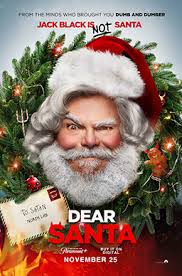
DEAR SANTA
US, 2024, 107 minutes, Colour.
Jack Black, Robert Timothy Smith, Keegan-Michael Key, Brianne Howie, Hayes MacArthur, Post Malone, P.J.Byrne, Jaden Carson Baker, Kai Cech, Ben Stiller.
Directed by Bobby Farrelly.
Seeing Jack Black on the poster as Santa Claus, there might be a few moments of scepticism!
This is a film from the Farrelly brothers who for more than 30 years have enjoyed making all kinds of satire from There’s Something about Mary too Shallow Hal…
This is a Christmas film with a difference. It opens, perhaps expectedly, a family grieving the loss of a child in an accident, moves with the remaining child to a new town, trying to settle in, parents blaming each other, and the young boy, Liam, Robert Timothy Smith, dyslexic. And he believes in Santa Claus.
He writes a letter to Santa but misspells, sending the letter to Satan. Which, of course, is where Jack Black fits in well, Satan trying to be Santa Claus, giving Liam three wishes demanding his soul after the wishes.
There is entertainment in the wishes, Satan persuading a sympathetic young girl at school to be interested in Liam, even to the extent of their going to a concert by a Post Malone, overcome by Satan and unable to remember the concert afterwards), Liam going on stage and performing with the singer, and it all filmed. Meanwhile, at home, his parents wanting him to see a counsellor played comically by Keegan-Michael Key.
Liam has a young friend, African-American, who has protruding teeth – fixed with the second wish.
Liam argues with Satan against the wishes but, overhearing his parents seemingly squabbling but actually reconciling, he wishes for the reconciliation, Satan then urging him to be his forthright self – which he does, with the bully and the pompous teacher.
Then a twist. Jack Black is only a minor Demon, on probation, and reprimanded by the real Satan, an uncredited Ben Stiller. He then does the right thing in telling Liam the truth and rewards everyone by resurrecting the dead brother. While audiences might be taken aback at this reality/in reality, there is a final twist because the young girl admires Liam because of his devotion to his dead brother. How will he explain the resurrection to her!
- Title, expectations, Santa Claus, happy Christmas themes? Ironies?
- The American town, the family moving after the death of their son, settling in, the home, the conflicts between husband and wife, the effect on Liam, school, dyslexia, taunts, Emma’s support, believing in Santa Claus? His mother supporting him, his father wanting to tell the truth?
- Liam, age, character, quiet, the dyslexia, taunted, supported by Emma, his strong friendship with Gibby, not telling his parents? His parents and their fighting? The accidental death of his brother? Mutual blame, blaming themselves? The effect on Liam? The issue of Santa Claus and truth?
- The decision to write to Santa, the misspelling, posting the letter, Satan receiving it, the decision to act?
- Jack black as Satan, his screen persona, comedy, touches of mania, the touches of mean-mindedness? The appearance, the misunderstanding, Liam thinking he was truly Santa, Satan playing along, the repartee, Liam’s responses, the issue of the three wishes?
- The reality/fantasy in the screenplay, Liam and his wish, Emma and her support, at school, in the classroom, the fussy teacher, Dickens, self-important, (and the later scenes, the bike riding, diarrhoea, the encounter with the level crossing guard, her abrasive personality, her course and training?) the bully and taunting Liam?
- Satan arriving at school, his behaviour at school, appearance, changing appearance, the change for Emma, her support? At home, the parents and their concern, Dr Finkelman, the discussions, the sendup of the counsellor? The arrival with the tickets, going to the concert, the best seats, backstage, the status of Post Malone as an entertainer? His being transformed, Liam going up onto the stage, the performance, the effect on Emma, the effect on Gibby and his disappointment? The filming and it spread on social media?
- Gibby, the second wish, his teeth fixed? Post Malone unable to remember anything about the concert when interviewed).
- Liam, changing his mind about the wishes, the discussions with Satan, hearing his parents and their reconciliation, misinterpreting, his wish that they be reconciled? And his being prepared to give Satan his soul? Satan and his encouraging Liam, to be forthright, the attack on the bully? The confrontation with the teacher? Emma and her change of heart?
- Satan, the revelation, half-Demon, the true Satan calling him to account, the reprimands, punishment?
- The effect on Liam, Satan’s explanation, the third wish nullified because the reconciliation happened without him?
- The credibility of the final wish, the brother coming alive again – but the final twist that Emma likes Liam because of his devotion to his dead brother, how would he explain?
Rumours

RUMOURS
Canada, 2024. 118 minures, Colour.
Cate Blanchett, Rolando Ravallo, Charles Dance, Nikki Amuka-Bird, Roy Dupuis, Dennis Menochet, Alicia Vikander.
Directed by Evan Johnson, Galen Johnson, Guy Maddin.
Esoteric and exotic are two words that come to mind while watching films by a Canadian rector, Guy Maddin. While he does have narrative and character development, his interest seems to be on the different kinds of impact films can have. His work is praised by critics. But, the average audience is bewildered.
While Rumours is probably the most accessible of his films, it still seems to have bewildered many of the public. To many, this seems so absurd a narrative, that they give up on it.
The basic plot outline, however, seems fairly direct. A meeting of leaders of the G7 takes place in ta castle in a German forest. The seven leaders meet for lunch, served in a pleasant gazebo, discussions, personal interactions, conflicts, and then their being stranded, lost in the forest at night. But, what happens to them in the forest, exposing of the limitations of their characters, the threats of impending apocalyptic doom, certainly takes them and the audience on unexpected paths.
The film does have the advantage of having Cate Blanchett in the central role as the German Chancellor, accented English and all. The other central character is the Canadian, Roy Dupuis, the most complex character of them all and he is given the final rhetorical declarations. The rest of the cast are strong character actors, including Charles Dance, of all people, as the ageing, prone to nod off, American President (and, just as it was a to explain his very proper British accent, he is cut off and we never know). Dennis Menochet dominates his scenes, a large man, -the intellectual, the French president. And Nikki Amuka-Bird, is a black prime minister from the UK.
The film might be seen as a political drama. However, the expose of the limitations of each of the leaders, leads to a satiric approach. The task for the leaders that we watch is their preparing for the communiqué, something like a school project amongst them, small groups, stating the obvious, truisms, platitudes. And then there are many farcical situations, some comedy. And, the three directors have though had an interest in conventions of horror films – so, excavations of 2000-year-old corpses, zombies, sex-obsessed, cavorting in the forest, and an AI program that is a perverse controller, and an overlarge-sized brain out their amongst the trees.
When asked to indicate approach to appreciating Rumours and its satire, a review suggests itself. What if the leaders of the G7, meeting there at the gazebo, all nodded off like the American President and had a communal nightmare. This would be the nightmare, cut off, lost, the very human limitations made all the more manifest, their being manipulated as the world seems to be going to its doom – and, rhetorically, standing there on the balcony, proclaiming some kind of hopeful G7 statement that might transcend the doom. Which means that both the leaders and we ourselves as the audience are often bewildered.
- The work of the directors? Exotic and esoteric? Ironic comedy? Drama? Touches of horror?
- The title, rumours, rumours of war…?
- The basic premise, the meeting of the G7, the world leaders, economic situation, the official statement, reassurance? The screenplay and the presentation of the leaders, strengths, and expose of weaknesses, personal incompetencies, self-importance, relationships, affairs? Their characteristics representing their nations? The meeting, lunch, the gazebo, discussions, the small groups, preparation of the statement?
- The German setting, the forest, the Castle, the gazebo, the forest? The events in the night, the darkness? The trees, the zombie-like creatures, the excavation of the bodies, Sylvain falling in, the sexual behaviour of the zombies, the ferry, the crossing of the water? The final scenes in this castle? The musical score?
- The German leader, memories of Angela Merkel, Cate Blanchet, the accent, in charge, hosting, her concerns, the attraction to Maxine, going to search for him, the sexual encounter, the aftermath? Her support, guidance? The encounter with Celestine, her being able to understand and translate?
- Maxime, Canada, the crises at home, the past affair with the British Prime Minister, his Celestine, the present with the German, his personality, his wife, deceptions? His crises and running away, the drinking, the clash with the British Prime Minister, the sexual encounter with the German leader, wandering in the forest, the discovery of the giant brain, discovering Celestine, the interactions with her? His carrying Sylvain after his collapse?
- The French Prime Minister, pomposity, large, history, his book on graves, the excavations, his literary quotes, historical quotes, relationship with the other members, especially with the Italian Prime Minister, his notes blowing away, his pursuing them, in the forest, falling into the grave, the struggle with the body, his collapse, Maxine carrying him, the wheelbarrow, the ferry?
- The Japanese Prime Minister, quiet, participating in the activities?
- The Italian Prime Minister, small, friendly, quiet, the cured meat in his pocket, helping everyone, is a special concern about the French Prime Minister, the wheelbarrow?
- The British Prime Minister, black, businesslike, the past relationship with Maxime, f ending him off, the participation in the activities?
- The American president, as played by Charles Dance, the British accent, the almost explanation but not given? Age, superiority, leader of the free world, yet his falling asleep, his wanting to sleep, the Italian Prime Minister saving him?
- The satire, the discussions for the statement, like small school groups discussing, the obvious, the platitudes…? The expose of the foibles? Lost in the forest, the zombies, the crises?
- Celestine, the past, the talk about a new world order, her language, her documents, past with Maxime, the translation, rescuing her? Talk about Astrid?
- The phone, the messages, Astrid, the little girl, asking for rescue, the group making their way to the Castle, entry, finding the Pres, the AI control, the accusations of sexual abuse, manipulation of characters? The death of the president?
- The finale, the world up in flames, the rhetorical speech, the seven on the balcony? How much satiric? How much some kind of hope despite everything?
How to Make Gravy
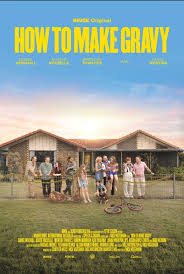
HOW TO MAKE GRAVY
Australia, 2024, 120 minutes, Colour.
Daniel Henshall, Hugo Weaving, Agathe Rousselle, Brenton Thwaites, Damon Herriman, Kate Mulvaney, Benedict Hardie, Fayssal Bazzi, Kieran Darcy-Smith, Kim Gyngell, Jonah Wren Phillips, Adam Briggs.
Directed by Nick Waterman.
Paul Kelly has been a musical icon in Australia for decades, singer and performer, composer, strong songs and lyrics. This film is based on his Christmas song, How to make Gravy, 1996 (the lyrics can be found by Googling). Producer, Meg Washington and her partner, director, Nick Waterman, have elaborated on the characters and situations in the song, creating a narrative – and introducing a most sympathetic character, not in the song, the prisoner, Noel.
The film has a Queensland setting, an extended family gathering for Christmas, the background of grief with the central character, Joe (Daniel Henshall) grieving the death of his mother. There is his wife, Rita (French actress Agatha Rousselle), his young son Angus (Jonah Wren Phillips) young daughters. For the Christmas dinner, his sister and brother, uncles, some of the guests are initially jovial, the grief surfacing, Joe highly aggressive towards his brother-in-law, a fight, the police, in prison.
In prison, Joe is victimised by a fellow prisoner, have Red, and other bullying prisoners. Joe has no anger management and fights back, to his detriment. His wife visiting, his son would like to visit, he has phone calls, but the families not sure how he is bearing up in prison.
Where the original song narrative is enhanced is the introduction of a most sympathetic life-sentence prisoner, Noel (Christmas name and ultimately his wearing the Santa Claus hat), a sympathetically vigorous performance from Hugo Weaving. Noel is charge of the prison kitchen, offers Joe a job, Joe offering his family’s recipe for making gravy. There are some jovial and joyful scenes in the kitchen, the cooking, and, eventually, the chaplain providing some wine for the gravy recipe.
Echoing Paul Kelly’s Catholic background, there is a young chaplain, not many in his congregation, a bit desperate. And there is a prisoners’ choir who perform with zest.
In the meantime, the screenplay offers the difficulties at home, Angus and his tensions, his musician uncle trying to help out at home (Brenton Thwaites), Joe in an angry outbur but provoked st being prevented from seeing his wife and son at Christmas.
How does the film bring everything to a climax – Angus angry with his mother and uncle, running away, going to the prison – but a kindly guard allowing Angus in and a happy reconciliation with his father. And the kindly Noel effecting some peace in the prison.
A film for Australian audiences to enjoy – with the hope that others will enjoy it as well.
- Paul Kelly’s song, popular, Christmas, prison, family? A dramatisation of the song?
- The Queensland setting, the town, home for Christmas, the prison, exteriors, interiors, the kitchen, the yard and fights? The musical score, the range of songs, music and lyrics?
- The Christmas theme, the first Christmas, 51 weeks later? Introduction to Joe, lying on his bed, Angus urging him awake, preparing for Christmas, the grief at the death of his mother, his relationship with his wife, daughters? The guests arriving for Christmas, the uncles, his sister and Roger, Dan, the separation, his daughter?
- The tension at the table, the speeches, the conversation, aftermath, family tensions, criticisms, squabbles, Joe and his aggression, Roger, the fight, the calling of the police?
- Joe in jail, his angers, his grief, the visits from his wife and their talking, his son wanting to visit, the phone calls? The routines of the prison, Joe being picked on, Red his associates, the violence, Joe as victim? The other prisoners, life in the prison?
- Noel, his Christmas name, Hugo Weaving’s presence, in jail for life, yet his attitudes, offering to help Joe, offering him the job in the kitchen, Joe and his return, the rules, the attendance at the meetings, the significance of the meeting, Joe telling his story, the response of the men? Joe and the recipe for gravy, the ingredients, no wine? The bonding with the men in the kitchen, the preparation of the meals? The preparation for Christmas, the detail? Joe at home in the kitchen, going to the concert, looking forward to Angus’s visit? Red picking on him, the fight, his being prevented from seeing his son?
- The men in the kitchen, the choir practices, the priest, talking with the men, the concert, the sermon, his drinking the wine, his bringing the wine as a gift for the gravy? Noel’s intervention?
- Rita and the children at home, Dan moving in, helping, the girls coping, the pressure on Rita, her love for Joe, her mother’s phone calls, her choices? Dan and his support? The dancing, Angus’s anger? Going to see Joe with Angus, his not being allowed the visit?
- Dan, his daughter, the woman across the street, her bullying sons picking on Angus, the fight? Her chatting with Dan, the sexual encounter? And having to come to terms with himself and Mary? Her saying she had forgiven him?
- Stella, with Roger, the visit to Joe, the tensions with Roger, the bouquet, his presence at the meal, the only one at home during the search, talking with John on the phone, the apology? Stella and the future with him, saying her choice was family or Roger?
- Angus, the upset, seeing his mother in Dan, running away, the search, the desperation? The bike, the dog and the bus, Paul Kelly as the driver, going to the prison, the sympathetic guard and surveillance, letting Angus in, keeping the dog? Bringing Joe to the visiting room, revealing Angus, the embrace?
- Joe and his final confrontation with Red, standing up to him and his bullying? Noel making him to go to the concert? Getting the meal, some kind of peace?
- The Christmas ending, family reconciliations, hope for the future?
Gladiator II
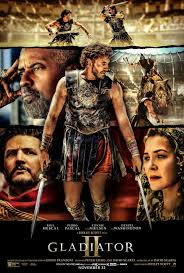
GLADIATOR II
US, 2024, 148 minutes, Colour.
Paul Mescal, Denzel Washington, Pedro Pascal, Connie Neilson, Joseph Quinn, Fred Hechinger, Lior Raz, Derek Jacobi, Matt Lucas, Tim McInerny.
Directed by Ridley Scott.
While sequels are often welcomed by an audience, they also often find it difficult to maintain the standard of the original film. Which is the case here. Gladiator won the Oscar for Best Picture in 2000 as well as an Oscar for Russell Crowe in his role as the strong Roman warrior, Maximus. She is one was a triumph for prolific director, Ridley Scott.
It was something of a surprise when plans were made over 20 years later for this sequel. The focus is on the son of Maximus who died in the first film, his son with Lucilla, the daughter of Marcus Aurelius. He is Lucius, played by Paul Mescal, seen first quietly living in North Africa, the Romans attacking under the leadership of General Acacius, Pedro Pascal, the North Africans defeated, taken to Rome, sold as slaves, many commandeered as gladiators.
Audiences will see the parallel scenario with the original film, the provinces, Roman warfare, prisoners, slavery, the Colosseum, gladiators, harsh life, brutality in the arena, political intrigue.
As with the original film, Gladiator II looks quite spectacular, special effects, naval battle sequences, extraordinary fights in the Colosseum especially against monstrous effect monster monkeys, and the recreation of a battle sequence in the Colosseum. Many of these scenes are very violent, and some of them exceedingly brutal in the impact. Sometimes we might wonder, as we watch the brutality of the fights and audience excitement that we are very much like these vicious Romans and their control of human life with thumbs down.
As with the Emperor, Commodus in the original film, there are two rather despicable emperors this time, the twins Geta and Caracalla (Joseph Quinn and Fred Hechinger) as symbols of the decline of the Roman Empire. Returning from the original film is Connie Neilson as Lucilla, daughter of Marcus Aurelius, mother of Lucius, recognising him, trying to make contact, eventually sacrificing herself for him. She is also in a relationship with General Acacius. One of the difficulties for the impact of the drama is that while Paul Mescal is exceedingly serious and single-minded as Lucius, he is not charismatically engaging for the audience a little in here and charm, while Pedro Pascal as Acacius does have leadership charism.
But, the big difference for this drama is the presence of Denzel Washington as the former slave with political and power ambitions, based on an actual character, Macrinus, a master in buying slaves, controlling the gladiators, with entree to the Emperor’s, deals with corrupt senators, waiting for his power grab moments, unscrupulous with his violence, even with the Emperors.
Given the limitations, the repetitions in parallels with the original, and the single-minded sternness of Paul Mescal as Lucius, audiences who enjoy Roman epics, will enjoy Gladiator II as well.
- The impact of the original film? Its legacy? So many years for a sequel? The continuity? The scenario of the first parallel scenario of the sequel?
- The work of Ridley Scott, epics? And audience response?
- The settings, North Africa, the city, the battles, the Navy, the Roman conquest? The road to Rome? The entry? The Colosseum, the quarters for the gladiators? The animals? The use of the Colosseum, fights, naval battles? The royal palace? Homes? The market for gladiators? The musical score?
- The links with the original, the mentions of Maximus, the flashbacks and the appearance of Russell Crowe? Connie Neilson as Lucilla, her relationship with Maximus, with, discovering with Lucius? Derek Jacoby as the senator?
- Africa, Lucius and his life there, relationship with his wife, warrior, silent about his identity, the local authorities, the attack of the Romans, the details of the battles, strategies, defeat? Imprisonment? The death of his wife, seeing her pass into the next life, grief?
- The prisoners going to Rome, the entrance to the city, the legions and the triumphant entry, general Acacius, his relationship to Lucilla, his tribute to the Senate, their suspicions, their wanting him to go on further conquests? His own response, with Lucilla, his significance in the revolt against Rome, his legions at Ostia, the sending of the message, his being trapped, sparing Lucius, his own death? Lucilla’s grief?
- The role of Macrinus, dented Washington’s presence, slave, freed, ambitions for the Senate, ruling Rome? The auctions of slaves, seeing Lucy is in action, his talents, strength, perseverance, purchase? His master of slaves and the treatment of the slaves? The training, the accommodation in the below the Colosseum? The fight in the Colosseum, the monstrous monkeys and battles, UCS and his survival? The response of the crowds, the emperors, thumbs up?
- The personality of Lucy is, silent about his identity, his anonymity in Africa, his relationship, the defeat, the death of his wife? With the other slaves? With the master of slaves, his being tested? With Macrinus? With Lucilla, her visit, his identity, his resistance? His eventually changing, the encounter with Acacius, the fight in the arena, spared, acacias death?
- The background of the emperors, their status, twins, effete life, games, the court, the worms? The attitude of the Senators? Acacius? Macrinus and his setting them up, the death of Geta?
- Arrow colour, wilfulness, childish, nominating his monkey as senator?
- Lucius, behind-the-scenes, the ex gladiator, observing, supportive Lucius, his sending him to Ostia to bring the troops?
- The buildup, the taking of Lucilla, in the arena, her death, the many troops converging on Lucius?
- The troops arrival, Macrinus and his control, his deals with the senators, the corrupt senator, the gambling, the meeting of the senators, Gracchus and the past, and government, decline? The death of Gracchus?
- The troops arriving, Lucius and his a leadership, the confrontation with Macrinus? And the future?
Green Border/ Zielona Granica
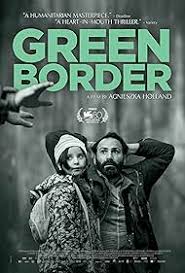
GREEN BORDER/ ZIELONA GRANICA
Poland, 2023, 152 minutes, Black-and-white.
Jalal Altawill, Maja Ostaszewska, Behi Djanati Atai, Tomasz Wlokok.
Directed by Agnieszka Holland.
Here is a sombre and demanding film – demands which should be made on world audiences, considering the events dramatised here, from October 2021 to the epilogue, February 22, 2022, the day of the Russian invasion of Ukraine.
For a moment, before the opening credits, there is an aerial shot of green trees – but, then, 150 minutes of sombre black and white, images and issues in stark black and white. This film was co-written and directed by veteran Polish director, Agnieszka Holland, who has been making films for almost 50 years, in her native Poland in communist times, and moving into Western Europe and many films and contributions to television series in the United States. Agnieszka Holland clearly identifies with the issues raised here.
For almost 40 harrowing minutes, we initially share some hopes with a Syrian family, refugees for Sweden, flown into Belarus, but becoming political and military pawns on the Belarus/Polish border, maltreated by border police on each side, and tipped, literally, over the border and back, a reminder that brutal and inhumane guards were not limited to the Polish concentration camps of World War II. We get to know the family well, parents, two children and a baby, an old grandfather, devout Muslim, a teacher. On the plane they meet a refugee from Afghanistan, an older woman, Leila, who joins them in their quest, victim of people smugglers, in their most unrelieved sufferings, a strong character with whom we can identify, especially in her subsequent fate.
The action then switches to the border guards, the political imperatives on both sides, government authorities not wanting the refugees, guards with a sense of duty but also the callously carefree attitude towards life, including their own. However, one guard, wife pregnant, witnesses what happens – and his conscience is stirred.
Then there is a chapter on the activists, earnest and committed men and women living near the border who are aware of what is going on, being forbidden to go into an “exclusive zone”, trying to rescue the refugees or to secretly bring them some kind of comfort and healing. There is a focus on a psychiatrist who is moved by the situation, volunteers to help, finds herself as the target of the border guards.
While there is some hope, some humanity in key characters, the film is a reminder that in the 2020s, savage wars are still fought around the world, invasions, civil wars, starvation, the desperate need for peace.
And, as mentioned, the film ends at the Ukraine/Poland border, and the information that Poland had received 2 million refugees from Ukraine – and the sad reminder that the hostility towards refugees from Asia and Africa is still sometimes virulent.
- A significant film about Europe in the early 2020s?
- The title, the opening aerial shot, the green, then black-and-white, the sometimes starkness of the black and white? And the musical score?
- The director, her Polish background, history, the history of Poland and Belarus, the communist era, post-communism, 21st century, political alignments, refugees from Asia and Africa, harsh stances and behaviour? And the epilogue of the invasion of Ukraine by Russia?
- The chapters, the focus on the family first, the contrast with the border guards, the further contrast with the activists, the focus on Julia and the connection of the stories?
- The plane ride, the refugees from Syria, the boy, Leila and her glasses, his picking them up, changing seats, the window, in the cloud, his father, the grandfather translating? The mother and the baby, the little girl? The background, refugees, the plan, through Belarus to Sweden, the financial arrangements? The establishing of the characters and audience response?
- Arrival in Belarus, the connection, the van, Leila coming with them, driving to the border, the oppressive driver, the demand for money, the previous payment, and being offloaded? The harsh experience in Belarus, the guards, operation, food and water, phones, batteries dying, trying to communicate? The response of each of the characters, the mother feeding the baby, lacking milk, the father and his desperation, the children and their needs? The old grandfather? Leila with them, her plea about Afghanistan? Their being tipped over into the Polish border, the barbed wire? The experience of the Polish guards, the repetition of the oppression, and then back into Belarus?
- The guards, the politics, attitudes of the government, Europe and refugees, harsh Polish stances, Belarus exploitation and the European Union? The treatment, the camaraderie, the carelessness, the exclusive zone? Day and night? The guards together, drinking, talking? The focus on Jan, his pregnant wife, the lecture and the instructions of the commander, callous, concern about his wife, the visit, the scan? His wife at the supermarket and the scorn for the refugees? At home? The bond between husband and wife? Jan, that the challenge to his consciousness, conscience, later the van, letting it through? And his returning home?
- The activists, the leader, her sister, the men and women, living near the border, their concern about the refugees, the exclusive zone, the vehicles, interactions, the pinning of the locations, and to help, medication, food, the Syrian family? Leila, crossing the border, with the little boy, their trek, the call to them, in the night, in the quicksand, the boy dying, Leila rescued, the hospital, her talking to the camera, begging forgiveness? Her later treatment, hospital, the documentation, plea for refuge?
- Julia, at home, therapy by Zoom, her husband dead from Covid, the encounter with the activists, her being moved, letting them come to her house, erratic sister, the leader, the man, the young couple, going out on expeditions, eluding the police, the driving, going to the zone, encountering the suffering people, the Moroccan man, his phone call, the soup, their leaving him, the rules, survival? Julia’s return, his absence? The decision always to go to those in need, young African men, her helping them, her arrest, the treatment in prison, her lawyer, coming out, the activists moving out, the erratic sister staying? The graffiti on the car, her asking her friend to lend her car, the discussion and her refusal? The driver with the towaway, the concealing of the refugees, the going to the house of Julia’s client, speaking French, the cheerful young men, the family meal, listening to music and singing? Signs of hope?
- The situation in 2021, the narrative, the docudrama, the harrowing emotions, compassion, desperation?
- The epilogue, the railway station, the 2 million refugees in Ukraine, Jan at the station, Polish compassion, yet the final information about the prejudice against the African and Asian refugees, and the conflict remaining on the Belarus Polish border?
Harder They Fall, The/ 2021
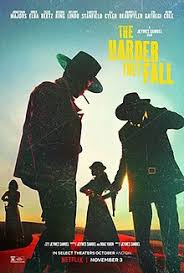
THE HARDER THEY FALL
US, 2021, 139 minutes, Colour.
Jonathan Majors, Idris Elba, Regina King, LaKeith Stanfield, Zazie Beeta, Delroy Lindo, Dion Cole, Michael Beach, R.J. Cyler, Edi Gatghegi, DeWanda Wise, Damon Wayans Jr, Danielle Deadwyler,
Directed by Jeymes Samuel.
The strong Western, using the various conventions of the American West, outlaws, violence, rivalries and politics. What makes it more significance is that it is a film which focuses on African-American characters in the West, very few white characters to be seen. And, as been written Jeymes Samuel, a British writer, producer, director, but also a songwriter and musician. And music featuring significantly throughout this film.
There is a very strong opening, in version of a home, parents and their child, the death of the parents, the leader of the troop, the carving the boy’s forehead – and moving 20 years forward.
The star of the film is Jonathan Majors as the boy growing up, leader of his own group, involved in robberies, but also a journey of vengeance, and his relationships with various members of his group.
The other central character of the film is Idris Elba as the gunfighter who carved the boy, was freed from prison, involved in money dealings, taking over a town, ousting the Mayor, and his followers. And, at the end, quite a revelation about the relationship of the two men.
There is a very strong cast indeed, a range of key actors, African-Americans. There are significant male actors like Delroy Lindo, LaKeith Stanfield, Damon Wayans Jr. But, it is even stronger, the African-American women, Regina King, Danielle Deadwyler, Zazie Beetz.
With seeing as a western, is a picture of the characters in the white American West, playing on the conventions, heroes and villains, and ambiguities of characters and behaviour.
- The title, in the context of the West?
- The settings, the western locations, action?
- The cast, African-American cast? Africans Americans in the 19th century West?
- Nat Love story, as a child, parents, the attack, their deaths, the carving on his forehead, the passing of 20 years, his new life, associates, killing Cortez? The robbery? The news about Rufus block? Nat and his relationship with Mary Field?
- The portrait of the supporting characters, in themselves, their Association with Nat Love, with Rufus Buck? Loyalties, betrayals, shootouts?
- Rufus Buck, at the opening, 20 years later, prison, pardon, the stolen money, his relationship with Trudy Smith, Cherokee Bill, the escape from the train? Killing the corrupt guards?
- Redwood City, wily escape, the mayor, buck whipping him? Escape and the money?
- Marshall Reeves, the arrest, capturing Love, the issues of revenge? The relationship with Cuffee? Mary, the proposal, the refusal? The buying of the saloon?
- The action, the to-ing and fro-ing, between Nat story, Rufus Buck’s story, the deals, the love for Cuffee?
- The wagon, the friends and betrayals, the money, the shootouts? Tesco’s death?
- The confrontation between the women, their fighting?
- Rufus Buck, with Love, the revelation about their father, his abuse, their being half-brothers, the shooting of the revenge? That killing Buck?
- The end, Marshall Reeves, in control, Cuffee in support? The grave? The death of Buck, the freedom for Nat Love?
Caine Mutiny Court-Martial, The/ 2023
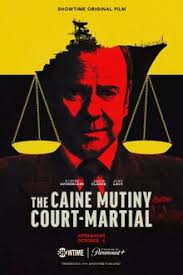
THE CAINE MUTINY COURT MARTIAL
US, 2023, 108 minutes, Colour.
Kiefer Sutherland, Jason Clarke, Jake Lacey, Monica Raymund, Lewis Pullman, Jay Duplass, Tom Riley, Lance Reddick, François Baptiste, Gabe Kessler.
Directed by William Friedkin.
In 1954, audiences worldwide were very impressed by Edward Dmytryk’s film adaptation of Herman Wouk’s celebrated novel, The Caine Mutiny. With a very strong cast including José Ferrer, Van Johnson, Fred MacMurray, the attention was on Humphrey Bogart as Captain Queeg, not the usual kind of character that he played. He was the captain of the ship, his subordinates accused of mutiny against him, the revelation of his character, his fixations, his nervousness…
In 1988, Robert Altman made a television version of the play based on the novel, The Caine Mutiny Court-Martial.
2023 saw a new version of the play, filmed for television, and, in fact, the last film by celebrated director William Friedkin (The Exorcist, Oscar for The French Connection). He directed the film in his late 70s.
Time and location for this story has been updated to the 2020s, specific dates, a situation of mines in the Persian Gulf. And there is all the contemporary technology to draw on. And, another change, the prosecutor has been changed from male to female, now played by Monica Raymund.
There is a very interesting male cast, Jason Clarke at his best as the defender, Jake Lacey in a much more serious role than usual as the officer accused of mutiny, Lewis Pullman as the sinister presence.
The film is dedicated to veteran actor, Lance Reddick, who appears as the presiding judge, a strong role, his last film role.
Where this version differs is that Captain Queeg is not presented initially so strongly neurotic as in the other versions. Here he is played by Kiefer Sutherland, defending himself, speaking forthrightly, the touch of the trembling hands. However, he is later called as a witness for the defence, the defence badgering him, and all his neuroses revealed – especially in the context of the testimony of eccentric behaviour explained by the main witnesses for the defence.
While Captain Queeg is condemned, the defence lawyer gives a speech honouring his service to the country over so many decades, the lawyer drinking, going to a celebratory party, and denouncing the sailor, the novelist, who, insinuating, brought on the fall of Queeg. And the film stops.
It is over to the audience, to relive their experience of the trial, the various testimonies, contradictions, denials, personal motivations, integrity… and make their own assessments and judgments.
- The long popularity of the novel and the film? The stage play the court-martial, Robert Altman’s version? William Friedkin’s version? The updating to the 2020s and contemporary technology?
- The film based on a play, the emphasis on dialogue, interactions? The audience imagining the episodes talked about? The end, leaving the courtroom, in the street? At the party? The musical score?
- The episode, the relieving of Captain Queeg of his office, the situation with the mines, Maryk taking responsibility? The episode seen as mutiny?
- The introduction to Maryk, age and experience, discussions with Barney Greenwald, his appointment a few days before, accepting him as defence?
- The proceedings of the court, the presiding judge, his focus of attention, decisions about objections, his interrogating the witnesses, the decision about reprimanding Greenwald or not? The other members of the bench attentive?
- Greenwald, his background, his tactics, his interviewing the range of witnesses, turning Queeg into the equivalent of the accused, little interrogation of him, awaiting his return? The eliciting of information, description of the episodes about Queeg? The cumulative effect?
- Challee, the prosecutor, a woman in this version, the attitudes, his determination, the questioning of witnesses, the defensive Queeg, her objections, not always sustained? The cumulative effect, her final speech and criticisms of Greenwald?
- Queeg, his presence, the impact, issues of his mental stability, his answers to questions, his explanation of the situation? Maryk listening to him, looking at him?
- Keith, his friendship with Maryk, his explanation of the range of stories about Queeg? Greenwald drawing him out? The contrast with Keefer, the novelist, advising Maryk, friendship with Maryk, the decision to go to the higher authorities, backing out?
- The young sailor, 20 years old, awkward, not familiar with court proceedings, his testimony?
- The witnesses for mental health, the psychologist, the defensive Queeg and his abilities? The intricacies of the cross examination? The doctor, limited experience in his work, of the Navy, his defensiveness?
- Maryk and his testimony, the prosecutor hostile, indicating his limitations of education and comprehension? Greenwald, drawing out the stories, Queeg’s strange behaviour, the stories, the key, the searching of the personnel naked, his testing out all the keys, the bucket of keys? The story of the banning of films? The banning of water because of one man having a shower? The persecution of the men? Maryk and keeping his log, quoting from it, Keefer’s advice?
- Queeg going on the stand, booking, the denials, issues of memory, his nervousness, twiddling his thumbs, the balls in his pocket, Greenwald and his further interrogations, the tangle of the stories, the cheese, the strawberries, his further entangling himself, his beginning to rant, self-justification, his condemnation of the men, their lack of discipline, order, his extremism, shirt hanging out…? Greenwald getting him to read out his positive testimony about Maryk?
- The final effect of Queeg testimony? The prosecutor and her business? Greenwald and his final comments? Talking with Maryk, saying he had murdered Queeg? Doing his duty as a defence lawyer?
- Discussions of mental health, sanity and insanity, signs and symptoms, control, paranoia, self-esteem, self-justification? Perfectionism?
- The aftermath, the issue of the party, whether Greenwald would go or not, his drinking, arrival, his harsh words, the confrontation with Keefer, exposing him as the power behind the throne, Keefer wanting to get Queeg, writing the novel, the money? And throwing the drink and his face?
- The finale, the sudden stop, leaving the audience to assess what they had seen, the defensive Queeg and his long service, yet his failure in command? The role of Maryk, respect and disrespect? Experience? And the malice of Keefer?
Heist Before Christmas, The
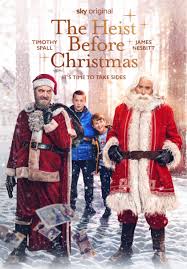
THE HEIST BEFORE CHRISTMAS
UK/Northern Ireland, 2023, 80 mintues, Colour.
Timothy Spall, James Nesbitt, Bamber Todd, Laura Donnelly, Joshua McLees.
Directed by Edward Hall.
Here is a slight and different Christmas film from Northern Ireland. And, it is not necessarily a charming Christmas story.
It opens with a bank robbery by a robber disguised as Santa Claus (James Nesbitt). The focus is on the town, especially young boy, Mikey (Bamber Todd) defying the headmaster, all kinds of mischief, all kinds of bitterness, at home with his single mother and his younger brother, she hard at work to make ends meet.
Mikey realises what has happened, goes in pursuit of the false Santa, discovers an old Santa lyng in the snow, mistaking him for the robber, this Santa being Charlie, a kind old man who imagines himself as Santa Claus and lives in local institution. And is played by Timothy Spall in Norwegian-accented English.
And so, the film moves along, what will Mikey do, can he possibly change, be sympathetic? What about Charlie and his being out there in the snow? And what about the robber, and his tactics to avoid capture?
So, more than a touch of the offbeat, not exactly the nice family Christmas film expected.
- The title, Christmas entertainment? Different?
- From Northern Ireland, the town, homes, shops, banks, the countryside? Carols and the score?
- The edge in Mikey’s behaviour and the possibility of his changing. Different Christmas film? The bank robbery? The bank robber, disguised as centre? Charlie and his dementia and thinking he was centre? The atmosphere in the town, Christmas celebrations, he and his family?
- The picture of the town, homes, shops, offices, the bank, the streets and celebrations, the countryside, the forest, the snow? The car chases and other vehicles? The musical score, Joy to the world?
- The focus on Mikey, his age, his attitudes, causing mischief at school, the reaction of the headmaster, his surliness, defiance, seeing the bank robber and the pursuit, his curiosity, pursuit? At home, his attitude towards his mother, to his brother? Audience response to him?
- The exasperated mother, at home, with the children, Mikey and his attitudes, her eventually slapping him, her upset afterwards? With Joshua, his age, difficulties, the hopes for Christmas, the bike? The poor situation? The mother at work, the boss, her being late, his attitude, her friend? With the customers, the raffle tickets? Joshua wanting the bite? Her changing the bucket of tickets? Not winning the bike, going into the office, discovering the truth, confronting the owner?
- The robber, disguised as centre, the chase to the town, his escape, in the forest? Mikey and his pursuit? Discovering Charlie, the Norwegian accent, talking as if he were centre, dressed as centre, Rudolph’s return…? Mikey returning with the soup, the bank robber, the confrontations, the gun?
- The adventures in the forest, Mikey wanting the money, escaping with Joshua, the continued pursuit? The vehicles? Mikey’s promise? The bag, the money? The slapstick comedy, all the accidents, the fights?
- Back into town, the identity of Charlie, the police, the officer and his laughing at his own jokes, the more sympathetic police officer? Shooting centre? Hospital?
- The pursuits, the climbing, the mother attacking the robber, her fall, the mayhem? Hospital?
- The target audience for this kind of Christmas film? Children? Family? Adults?
Dead Don't Hurt, The
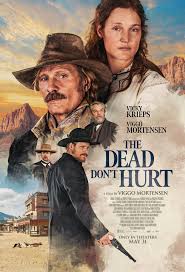
THE DEAD DON'T HURT
US, 2024, 129 minutes, Colour.
Vicki Krieps, Viggo Mortensen, Solly McLeod, Garrett Delahunt,.W. Earl Brown, Danny Huston, Shane Graham, Rafel Plana, Atlas Green, Ray McKinnon.
Directed by Viggo Mortensen.
Now veteran actor, Viggo Mortensen, became a household name when he appeared in the Lord of the Rings trilogy as Aragorn. Mortensen is not only an actor, he is a writer, musician, composer, and has brought all these talents to directing The Dead Don’t Hurt.
In fact, the setting is in the West during the American Civil War. However, the action takes place on the Nevada border and the war itself seems distant. Which means that the film is set in the West, its saloon, gamblers, sheriff, shootouts, but the story is told in such a way that it could take place at any time.
The film opens, significantly because of his title, with a death. There is also a violent shootout in the streets, a court case, a lynching execution. But we have to pay attention because the film moves both forward and with flashbacks, important for the audience to gauge which is which to appreciate the characters and the dramatic development. Sometimes this is something of a challenge.
But, in the flashbacks, we are introduced to Olson, Scandinavian background, arriving in a port, eager to make his way in America. But, the audience has also had a long introduction to a young girl, Vivienne, French background, her father executed by the British, a forthright young girl with an imagination (including a Knight in armour coming to visit her, a scene with which the film opens and will recur). Olson and Vivienne hit it off immediately, some comeuppance to an arrogant young suitor in the town, and they travel to the Nevada border, setting up house, Olson a capable builder, working for some of the money men, profits from gambling, in the local town.
Vivienne is played by Vicki Krieps, the core of the drama and our emotional response.
Audiences need to keep checking on the timespan. After a while, there is a visit and plea from a recruiting agent for serving in the war, Olson, despite Vivienne’s protests, volunteering to go, absent for many years, some letters getting through, some not.
At the dramatic centre of the film is Vivienne’s coping during Olson’s absence, the working in the local bar, hired by the moneyed man, but aggravated by his irresponsible sociopathic son. There are dire consequences for everyone concerned and, gradually, the storytelling arrives back at the violence in the streets, and at the death and dying scene we first saw.
As expected, ultimately, this is also an avenging Western.
The film is intriguing, playing with the audience’s appreciation of characters and story, the interplay and tension between the past and the present – and, with the death, the irony of the title and its implication that The Living Do Hurt.
- The title? Evocative? The opening, Vivienne and her death, the flashbacks, her life and death?
- A variation on Western themes? The era of the Civil War? The Nevada border? Migrants, experiences of war, our, mining, gambling, our in the West?
- The location photography, the beauty, the desert, rivers, ports? The musical score?
- Setting of mood with the opening, the Knight in armour, in Vivienne’s dream, his reappearing during the film, echoes of Joan of Arc, his appearing, reassuring, at her death? Focus on Vivienne’s face, Olsen and his grief?
- The violent episode in the town, at Weston Jeffries, cold, calculating, arrogant, the shootings, the death of Billy? The response of the Mayor, going to the grave, Olsen burying his wife, Vincent present, the story of the violence in the town?
- Court case, the victim for the killings, the religious righteousness of he judge, the woman in the court defiant, guilty verdict, the hanging? Olsen observing and leaving?
- Olsen and Vincent leaving, riding through the countryside?
- Audiences adjusting to the time sequence, the bulk of the film being flashback, the story of Vivienne, French, her parents, the war, her father hanged? In the Port, the relationship with the wealthy man, his treatment of her in the restaurant, her defiance, her attraction to Olsen, talking, going off with him, taking him to the house, the art gallery? Forming a bond?
- Olsen in the town, his background, war? Travelling with Vivienne, the land, setting up, his building talent, working on the other barns? Vivienne upset at first, the flowers and trees, their life together? Her going to work in the bar, the older Jeffries and his power, the discussions with the mayor, the financial deals, the gambling, the adjacent houses, prostitution? The manager of the bar, some integrity? Weston Jeffries in the bar, his arrogance? The violent episode with Weston Jeffries and the piano player, the song, the brutality, commanding him to play? Vivienne and later support of the pianist, his family, the daughter, learning French?
- Olsen, the Civil War, the recruiter in the bar, his deciding to join the Army, Vivienne and her upset, his leaving? Away for so many years, the letters, some received, some not?
- Vivienne, managing, the house, her independence, at the bar? Weston Jeffries following her, her cat in cutting, the violent rape, the aftermath, in the bar?
- Her pregnancy, giving birth, the child, the years passing, the bond between mother and son? Life in the town? Olsen and his eventual return, the important sequence revealing the child, Vivienne quietly spoken, Olsen and his response, leaving, in the river, swimming? His anger at Jeffries?
- The boy, his manner, with Olsen, the acceptance, the building and Olsen showing his son how to hammer? The possible good life?
- The request for Olsen to become sheriff, the discussion with the Mayor, his office? Billy and his delivering the letters, his becoming the assistant? But the audience knowing from the beginning what was to happen?
- Vivienne, illness, syphilis, from Weston Jeffries, the dangers, her death and her vision? The burial?
- Olsen and Vincent, riding, the encounter with Weston Jeffries, the guns, the confrontation, Olsen throwing the knife, overcoming him?
- The story continuing, Olsen and Vincent arriving at the ocean, contemplating the ocean? Sadness, regrets, hopes?